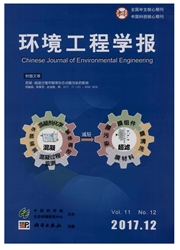

 中文摘要:
中文摘要:
为研究低品位锰尾矿胶凝活性,将生石灰、氢氧化钠、水玻璃和石膏等激发剂添加到湖南永州低品位碳酸锰尾矿中,采用正交实验研究不同激发剂及掺量对锰尾矿基胶凝材料抗压强度和软化系数的影响,探究其潜在胶凝活性激发的最佳配方。实验结果表明,当生石灰、水玻璃、石膏掺量分别为10%、1.5%和4%时,胶凝材料净浆试体的各个龄期抗压强度最大,其中28 d抗压强度达到4.91 MPa,软化系数达到0.74。XRD、DTA和SEM微观实验发现:锰尾矿基胶凝材料主要水化产物为钙矾石和水化硅酸钙凝胶,随龄期持续增多并相互交织搭接,使试体内部结构逐渐致密,缝隙减少,提高了试体抗压强度和软化系数,因此,该激发剂可有效激发锰尾矿潜在胶凝活性。
 英文摘要:
英文摘要:
The cementitious activity of low-grade manganese tailings was investigated by adding quicklime,sodium hydroxide,sodium silicate and gypsum to low-grade tailings of manganese carbonate,which were procured from Yongzhou city. The effects of different activators and their contents on the compressive strength and softening coefficient were studied by orthogonal testing in order to obtain the optimum proportion at which the potential cementitious activity of manganese tailings can be stimulated. The results showed that the compressive strength of the slurry during various curing periods reached the maximum when the contents of lime,sodium silicate and gypsum were 10%,1. 5% and 4%,respectively. The 28 d compressive strength reached 4. 91 MPa and the softening coefficient was 0. 74. Detailed structural analyses using XRD,DTA and SEM techniques showed that the main hydration products were ettringite and hydrated calcium silicate gel,which continued to increase with prolonged curing and became interleaving and lapping,thereby reducing the internal gap. The resulting dense internal structure improved the compressive strength and softening coefficient. Therefore,the activator is able to stimulate the potential cementitious activity of manganese tailings.
 同期刊论文项目
同期刊论文项目
 同项目期刊论文
同项目期刊论文
 期刊信息
期刊信息
